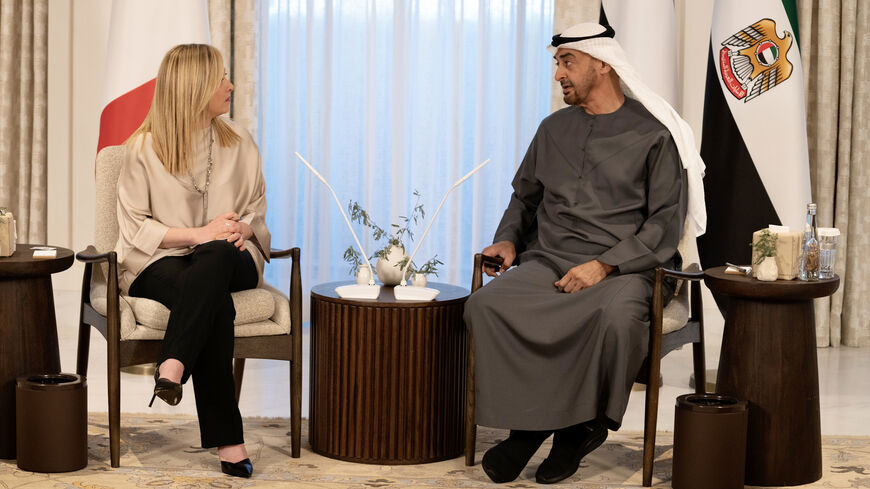Italy announced last week a full and immediate end to its arms embargo on the United Arab Emirates, imposed by the former government of Giuseppe Conte against both the Emirates and Saudi Arabia in January 2021 over the war in Yemen.
At the time, the UAE had ordered Italy to evacuate a key military base in the country in response and denied Rome access to its airspace.
Although the damaged ties later prompted Italy to loosen some restrictions on arms sales to the Gulf states, Prime Minister Giorgia Meloni, six months after her election victory, now seeks to fully shelve past tensions as she sees Abu Dhabi as a vital Gulf partner for Rome’s geopolitical interests.
Indeed, the move followed a strategic partnership between Italy and the UAE last month, which entails “deepening the horizons of cooperation in areas of mutual strategic interest, including political, diplomatic, international, economic and trade cooperation,” according to a joint statement after Meloni visited Abu Dhabi in March.
Outlining her foreign policy vision, Meloni opined in UAE-owned The National that “investing in the broader MENA region is one of the key priorities of my government, and we believe a close collaboration with the Gulf states is critical in order to tackle the challenges of the 21st century."
Energy cooperation
Subsequently, Italian energy company Eni penned in March a cooperation agreement with Abu Dhabi National Oil Company (ADNOC), aimed at expanding joint investments and research and development opportunities in the oil and gas sector. The agreement also includes plans to explore new research opportunities in renewable energy and sustainability.
“Italy has faced problems with advancing its own energy projects, making it more import reliant, and after the vulnerability from abandoning Russian gas overnight, its desires for new energy partnerships are a key motive for increasing relations with the UAE and the Gulf,” Irene Ivanaj, a Rome-based Italian affairs commentator, told Al-Monitor.
However, while the fallout from Russia’s invasion of Ukraine has accelerated Rome’s desire to build new energy partnerships, a wider framework for bilateral economic cooperation has emerged.
There are also interests in non-oil trade, with many Italian companies that are partly or fully state-owned that are now encouraged to do business with the UAE. Therefore, bilateral investment will likely increase. Ivanaj added that Meloni’s government seeks to act in the “national interest” by supporting these companies.
Italy is the European Union’s top trading partner with the UAE, with over 600 Italian businesses operating in the country, according to the ICE-Italian Trade Promotion Agency. Agri-food, jewelry and machinery make up Rome’s main exports to the UAE, the agency’s data show.
Ivanaj also noted that due to Italy’s caution over investment from China, per its support for the US-led world order and Meloni’s own realist foreign policy ideas, investment from other wealthy nations like the UAE would be more welcome.
It’s not just bilateral relations that are growing, but there are mutual strategic concerns too. Italy’s attempts to take a mediatory role in regional crises to provide security would overlap with the UAE’s firm influence. Indeed, alongside Rome’s pragmatism, Abu Dhabi has established itself as an influential medium power in the region in recent years, while since 2021 it has advocated a “zero problems” policy toward its neighbors amid what analysts considered a “great reset” in the Middle East.
“At the geopolitical level, there are desires for enhancing bilateral cooperation in various scenarios. With Abu Dhabi’s recent less confrontational policy in the region toward its traditional adversaries, coupled with Rome’s desires to mediate and its hopes to build ties with the Gulf, it can lead to stronger partnerships between Rome and Abu Dhabi,” Riccardo Redaelli, professor of geopolitics at the Catholic University of the Sacred Heart, Milano, told Al-Monitor.
Mediterranean backyard
Meloni also wants to centralize Rome’s role in its “backyard” in the Mediterranean. This has manifested in Libya, where despite supporting different sides in the conflict between 2019 and 2020, with Italy backing the Tripoli-based government and the UAE previously supporting Khalifa Hifter’s forces in eastern Libya, both countries’ interests have become more aligned as the conflict has subsided.
“Currently, the UAE and Italy see more eye-to-eye over Libya, given that the UAE has shifted from supporting Hifter and both countries back [interim Prime Minister] Abdulhamid Dbeibah. This is reflective of how divisions have eased, and this enables Italy to adapt to the UAE’s role in Libya,” Karim Mezran, senior fellow at the Atlantic Council, told Al-Monitor.
“Italy realizes that it cannot have a powerful enemy in the region (namely the UAE) without compromising on its own positions. I’d therefore expect cooperation between the UAE and Italy over building security in Libya to increase,” he added.
Speaking of further security cooperation between the UAE and Italy, Mezran also expects future joint military exercises between the two countries. He also highlighted the UAE’s desire to benefit from Italy’s security systems and renewed military exports.
More broadly, Italy has reached out to other regional countries for energy partnerships, including Algeria and Egypt, while it wants to build bridges with Cairo after a fallout following the murder of Ph.D. student Giulio Regini in 2016.
“Italy has announced the idea of a new 'Mattei Plan’ for Africa, inspired by the founder of Eni (Enrico Mattei) who envisioned a strong solidarity approach within the West’s traditional economic policy,” said Redaelli. “Though still in its formative stages, this plan seeks effective economic and energy cooperation over North Africa and sub-Saharan Africa, which would likely trigger bilateral Italian-Emirati initiatives to support development and stabilization.”
Redaelli added that such cooperation in the Horn of Africa would likely emerge, given Italy’s historic ties to the region and the UAE’s significant geopolitical and economic influence. Stability in the Horn of Africa is important here due to its proximity to maritime trade through the Red Sea, while it is a source of migration to Italy through Libya.
Indo-Pacific dimension
Interestingly, Italy’s ties with the UAE also boost its objectives in the Indo-Pacific, and more importantly closer to the Mediterranean. Meloni visited New Delhi before arriving in Abu Dhabi in March, which saw Italy and India strengthen bilateral ties, particularly in defense cooperation. As Mezran said, Italy feels it must tilt to the Indo-Pacific to offset the threat of China in the Mediterranean.
And although the UAE has developed strong bilateral relations with China — in a “balancing act” between Washington and Beijing — its proximity to the Indian Ocean has meant Italy must maintain a presence there to help it work with its Indo-Pacific partners.
Italy’s desires to restore relations with the Gulf have been driven by pragmatic concerns over energy and security, as Rome also seeks to support US-led endeavors toward countering Russia while exercising caution on China. The announcement to lift restrictions on weapons sales is another symbolic move in Italy’s efforts to strengthen its ties with the Gulf, wherein it evidently views Abu Dhabi as a leading partner.
While Italy playing a long game toward the Gulf may depend on greater longevity of its government, at least these newfound energy ties could underpin closer cooperation between Rome and Abu Dhabi in the future.








